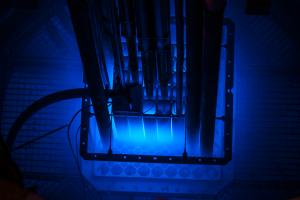Reports

The lectures and evening performances by Color Force at the Centre for Advanced Applied Science (CAAS) Gala Assembly captivated and enthralled the audience. The program on Thursday November 4, 2021, shortly after 4 p.m. at the Archa Theatre was introduced by CAAS Director and Dean of the Faculty of Nuclear and Physical Engineering of CTU Prof. Igor Jex, who himself prepared one lecture - Fractals and Quantum Information.

As one of the largest R&D public-private partnership in Europe – kicked off in October 2016 to join efforts with the aim to build an ecosystem for aerospace technologies – at the MSV-International Engineering Fair, the Czech Technical University’s Centre of Aviation and Space Research CTU in Prague and GE Aviation Czech announced an expansion of their collaboration to demonstrate Sustainable Aviation Fuel (SAF).

Rector of CTU doc. Vojtěch Petráček sent an open letter today to the Minister of Health of the Czech Republic Adam Vojtěch, in which he strongly protests against the aggressive campaign, using real images of the dying and the dead at COVID to "motivate" them to be vaccinated.

2021/11/08
A light blue glow, Cherenkov radiation, is produced when a charged particle moves through space at a higher speed than the speed of light in that environment. It was this phenomenon that the Department of Nuclear Reactors (DNR) of the Faculty of Nuclear and Physical Engineering of the Czech Technical University in Prague (FNPE) demonstrated to students on its school reactor VR-1 Vrabec in early November.

The Korea Testing Laboratory (KTL) was established in 1966 by the Korean Ministry of Trade, Industry and Energy to promote new technologies by testing and evaluating them and to create new standards. It is now focusing on the area of new Industry 4.0 technologies and the application of artificial intelligence. KTL is also an important link in pushing 5G mobile networks into the management of modern manufacturing processes. These are also the strengths of CIIRC CUT in Prague, where within the unique Industry 4.0 Testbed with the newly implemented first stand-alone 5G private network, CIIRC is experimenting and within the National Industry 4.0 Centre supporting the dissemination of these technologies to industrial companies in the Czech Republic and the creation of joint use cases.

On Sunday, 24 October, the Eye was officially opened over Nebusice. The original viewpoint was designed and built by students of the Seho-Poláček studio from the Faculty of Architecture of the Czech Technical University in Prague. The Eye is a viewing platform as well as an unconventional swing.

It has been one year since the first patient was successfully connected to the CoroVent pulmonary ventilator which was developed by a team led by Professor Karel Roubik from the Faculty of Biomedical Engineering of the Czech Technical University (FBME) in March 2020 in response to alarming reports from around the world about the rapid increase in the number of COVID-19 virus patients and the shortage of pulmonary ventilators to treat these patients in Italy and other countries around the world. It happened on 31 October 2020 at the Regional Health Masaryk Hospital in Ústí nad Labem.

Rector of CTU doc. Vojtěch Petráček participated in the commemorative act at Prague's Hradčany Square on 28 October 2021. On the occasion of the 103rd anniversary of the Day of the Establishment of the Independent Czechoslovak State, he and other rectors honoured the memory by laying a bouquet at the statue of the first Czechoslovak President T. G. Masaryk.

The Academic Senate of the Czech Technical University in Prague has today elected Associate Professor Vojtěch Petráček as the person nominated for Rector of the CTU in Prague. In the first round of the election he received 30 votes out of a total of 36. He was the only candidate proposed to the Academic Senate of the CTU. The proposal for appointment as Rector will be submitted to the President of the Czech Republic through the Minister of Education. The new and second term of office for Associate Professor Petráček will begin on 1 February 2022 and will last until 2026.

The current Dean of the Faculty of Civil Engineering of CTU, prof. Ing. Jiří Máca, CSc., FEng. will continue to lead the Faculty after his appointment by the Rector of CTU. On 20 October 2021, he was elected by the Academic Senate of the Faculty as Dean for the second term of office, February 2022 - January 2026.